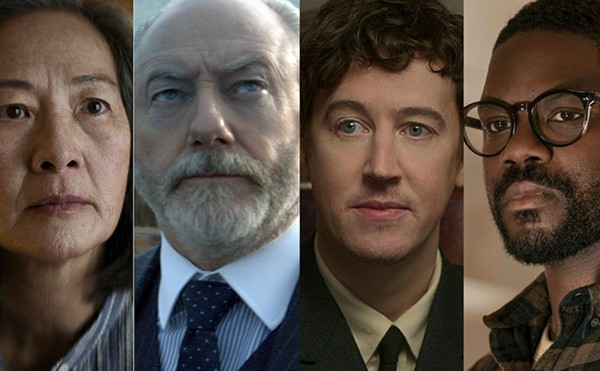The doc days of summer
First off, an update: That lefty film club Ironweed, discussed here a few weeks back (ironweedfilms.com), doesn’t release each month’s film in a limited edition just to toy with viewers. The idea, I’ve learned, is that each title is made available briefly in the hopes that theatrical distributors will pick up a film (these are mainly movies just coming off the festival circuit), without having to worry about competition from video stores. Godspeed!
In other cool-new-label news, Palm Pictures recently started distributing an imprint dubbed Arthouse Films, which so far looks fantastic. After a few informal releases, the series’ first two titles are high-profile docs about brilliant photographers: The Impassioned Eye, about Henri Cartier-Bresson, and William Eggleston in the Real World. (The latter of these was directed by Michael Almereyda, who has taken a break between features for docs and TV; his last fiction film, the almost-unseen Happy Here and Now, came out recently on disc from MGM.) Palm is following those two up with Who Gets to Call It Art?, a trip through New York’s art scene in the ‘60s, focusing on the Met’s first curator for contemporary art.
One of the painters featured in that film gets a portrait all to himself this month, via First Run’s release of 1975’s A Bigger Splash. Following David Hockney from London to the U.S. around the time he made some of his most famous work, Jack Hazan’s film is particularly interested in the painter’s relationship with his model-boyfriend, Peter Schlesinger. The focus on homosexuality is so explicit, in fact, that the film was once banned.
Last weekend’s “Lebowski Fest” in Austin has me in a receptive mood for A League of Ordinary Gentlemen (Magnolia), a look at professional bowling — but I’m even more grateful for the chance to spend time with a few men who are anything but ordinary: Crumb (Sony), the unforgettable Terry Zwigoff film about the most important cartoonist of the hippie underground (released to coincide with Zwigoff’s Art School Confidential); Bukowski: Born Into This (Magnolia), which goes behind the author’s famous swagger with a great deal of candid vintage footage; The Cruise (Lions Gate), in which Capote director Bennett Miller captures another character seemingly unsuited for this world, New York tour guide, amateur philosopher, and connoisseur of wonder Timothy “Speed” Levitch; and Porn King (Blue Underground), about legendarily filthy publisher Al Goldstein and his Larry Flynt-like courtroom grandstanding over free speech. (The most recent fish-out-of-water story, Reel Paradise, has gotten plenty of ink from me, but I’m amused to note that the recent Wellspring DVD has commentary from director Steve James and from Janet Pierson, one of its subjects, but none from Janet’s husband John, whom I know has plenty to say about his depiction here.)
But back to ordinary Joes. Criterion offers the 1976 Oscar-winner Harlan County USA, Barbara Kopple’s look at a Kentucky coal miner’s strike that tore up a small community for more than a year. Sadly timely these days, with current events suggesting that today’s mines aren’t as safe as we assume they are, the film has obvious social significance. Less obvious is that it would have such lovely music on its soundtrack, accompanying scenes of angry protests with beautiful voices like that of bluegrass vet Hazel Dickens.
After that coal-stained journey, documentary fans’ senses may be in need of some soothing. Two eye- and ear-candy films do just that. Shapes of the Invisible (Facets) uses high-tech super-magnification devices to zoom further than you’d believe into the surface of steel, hair, plants, and so on; while a calm British narrator explains what you’re seeing, the camera slides seamlessly from a normal view down to the point at which you’re looking at actual atoms. Facets will get rich if they can market this thing in head shops. Finally, viewers of Touch The Sound (Docurama) will enjoy it in one way that its subject cannot: Grammy-winning percussionist Evelyn Glennie, whose work is presented here with the same artfulness director Thomas Riedelsheimer brought to his Andy Goldsworthy film Rivers and Tides, is deaf.
















